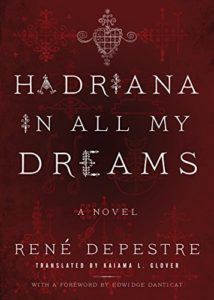Zombies, Vodou, carnivals, mysteries of erotic passion and tales of unrequited love all flood the pages of René Depestre’s book, and it’s taken nearly thirty years to be released in English. Perhaps the English-speaking world wasn’t ready for the unapologetic sensuality of this book in 1988, but I can’t think of a better time than now for us to drink in the pleasures of Glover’s translation.
Hadriana in All My Dreams reminds us of the things the Western world has lost in its hyper-intellectual quest to dominate economies and countries, hearts and minds: the rich mysticism of traditional cultures, the raw beauty of the natural world, a thirst for magic and mystery, and a lust for life that pervades the everyday to its bones.
It’s 1938 in Jacmel, Haiti, and Patrick is about to lose his godsister Hadriana. She’s marrying Hector, and in the chaos of the wedding preparations no one has much time to consider that she might become the next victim of Balthazar Granchiré, the ravenous butterfly incubus that regularly deflowers the virgins of Jacmel. In a city of zombie cars, women with seven loins, carnival orgies, and witch doctors, Patrick and Hadriana must choose to “dance, sing, drink rum, and refuse death,” even as they walk among the living dead (and the dead living).
Depestre devotes entire chapters to fascinating zombie ephemera. Local anecdotes, newspaper editorials, first-person historical accounts, interviews, essays, a zombiferous pharmacopoeia and even a letter from a zombie bolster Patrick’s lifelong quest to decipher the mysteries of Jacmel’s zombies.
There’s an eerie comparison between Jacmel’s zombies and some of the bleaker aspects of postmodern culture. The zombies have “no common interest[s] or passion[s],” and they are wholly “indifferent to people, animals, things, and plants.” The city itself exhibits zombie traits as “Time, hope, doubt, reason, compassion, tenderness, and even the will to live… all evaporate[s].” In our current time of political and social retrograde, maybe we can identify with the citizens of Jacmel, which “lives in the past with as much intensity as it doubts its own future.”
Maybe we can also identify with Hadriana’s yearning to fly away, “getting drunk– an eagle, feathers blowing in the wind, talons unsheathed,” or with her desire to lose herself in beauty, “the twinkling stellar cupola of the night sky within my reach.” Ultimately, Hadriana in All My Dreams is about looking death in the eye and screaming a yes to life that resonates in all the wild, ecstatic places of our true selves.
Hadriana in All My Dreams is available from Akashic Books and Amazon.
